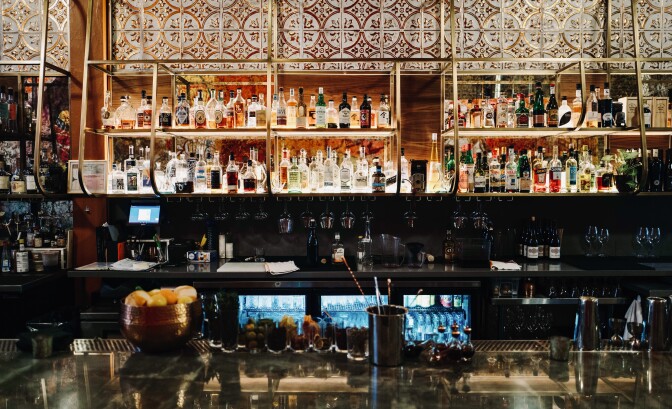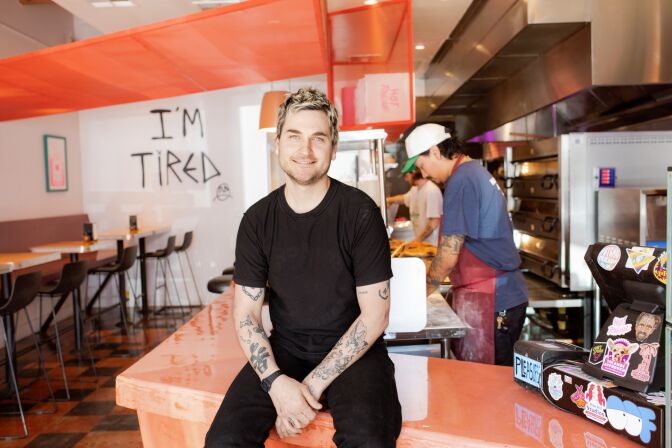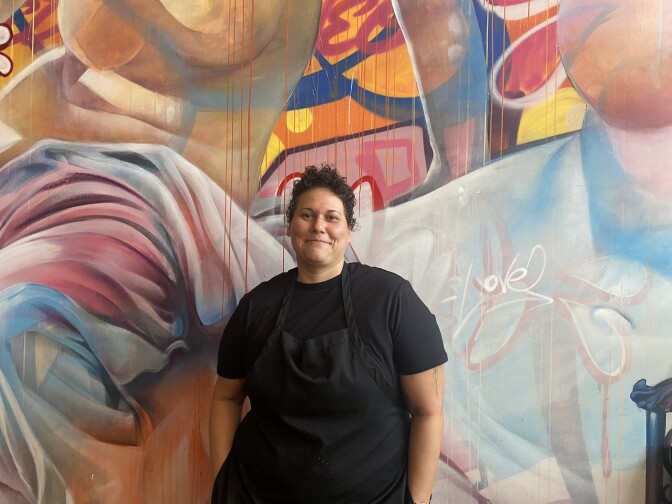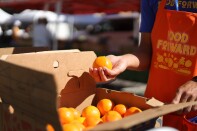This story is free to read because readers choose to support LAist. If you find value in independent local reporting, make a donation to power our newsroom today.
Has your favorite restaurant closed recently? We asked three chefs why it’s so hard out there

Los Angeles has seen several notable restaurant closures in the past few weeks.
Hart House, the vegan fast food chain owned by comedian Kevin Hart, closed all four locations. Pink Taco, located on the Sunset Strip in West Hollywood, abruptly shuttered its doors after 12 years. Otoño, a well-reviewed Spanish-inspired restaurant in Highland Park is now closed. Acclaimed Gorilla Pies in Valley Village has gone on hiatus to “reimagine how we can better serve you.”
Eater L.A has kept a running total of this year’s closures, and it’s 75 so far. Compared to last year’s 65 eateries that closed over the entire year — it’s clear that it’s grim out there.
To get a better picture of the current situation, we reached out to three business owners: Nicole Rucker, owner of Fat & Flour in DTLA and Culver City; Chef Teresa Montaño of the now-shuttered Otoño; and Alex Koons, of Hot Tongue Pizza in Silver Lake, who made the decision last year to add meat to his vegan pizzeria menu with hopes of attracting a larger customer base. All three have been vocal regarding the hardships they’ve faced recently.
(Note: these conversations have been edited for clarity and length).
What’s the situation?

Nicole Rucker:
“This summer, we experienced a drop in our business that started on June 1st, which came after we had recorded high sales in 2023.
The beginning of the year, it's normally a little bit slower, and then we look to summer for when tourism comes to L.A. [But] this summer, it took a sharp drop down and just kept getting worse. In August, we saw the worst sales that we've seen since 2021.
August was worse than July, and July was worse than June. And in total, it's about a 30 to 40 percent drop. And then the heat wave that came was the nail in the coffin for a lot of people. That was brutalizing."
Teresa Montano:
“A significant part of it is just how much the cost of everything, the cost of doing business in Los Angeles, has gone up. And after COVID-19, so many things changed.
There were just these compounding factors that kept hitting us. We closed for about 15 months during COVID-19. In that time, we did a little market thing, but ultimately, dinner service was down for 15 months, which was nuts.
One of the major things that I noticed was that dining habits changed. People were still scared to come out, so they decided to change their lifestyle and start cooking at home.
The other factor is that third-party delivery apps made a killing during COVID-19 because all the restaurants were down. These parasitic apps came in and stole half the market.
A lot of people have got used to that. And that has become their dining, instead of going out to restaurants. When we reopened the first year, we had an incredible year, of course, because people were excited that we were back.
But I think after that initial pop dissipated, we were in the boat with everyone else."
Alex Koons:

“It just seemed the summer was so dead. It was scary. My wife had dipped into her funds to pay for payroll multiple times.
I've been in pizza for almost 15 years, and it feels like I've had to work five times harder for everything these last couple of years.
I'm not saying the restaurant industry was easier before this, but just seeing and hearing about all the struggles, seeing Gorilla Pies close their doors, and other friends, it was just me saying, ‘If we didn't make this decision, [about adding meat] we would have been closed. There has to be a bigger play. And opening up to a bigger demographic.
I think my ego was quite big as a pizza maker. Bread has always been the defining factor that I find to be important in pizza, and it's something that I'm very good at. I thought that would be enough to get people who might not necessarily eat vegan food in the door. But it's so funny, living in a bubble or having a perspective of only your own — you don't realize that.”
What can be done?
Nicole Rucker:
“I would like to see a small business tax plan that really takes care of small businesses. I would like to see money become available to small businesses that are not from online bank sources that charge exorbitant interest rates. Because something that changed with the pandemic is that it is more and more difficult for truly small businesses.
And by that, businesses who do under a million dollars in sales. It's very difficult for people like me to get money these days from places that aren't charging 17 to 20% interest.
But the other thing is people are scared because there's so much messaging about the economy being bad. And we're all trying to save where we can, and groceries are expensive, but if we do care about the health of small businesses within our communities, then we have to support the places that matter to us.
Because following three months of really terrible sales, that’s when you start to see doors closing. If you're lucky, you have three months of backup in the bank. That would be really great to have, but we just used it all on summer 2024. It's gone now for most people. So a lot more places are going to close before the end of the year because it's so hard to navigate."
Teresa Montaño:

“It's really just looking at the policy and getting rid of all those old systems, lowering the prices of things and stopping gouging small businesses. We're paying the taxes and employing people, which are way too high in California. There's just so much red tape. And then you open, and there's even more. There's even more. It's just like regulation after regulation.
Thank God we dodged the junk fee bill [a bill to remove extra fees from bills that ultimately exempted restaurants]. Maybe it's a good intention, but it makes doing business harder. And small businesses are leaving California, but huge businesses are also leaving, so that should be an eye-opener to the lawmakers.”
Alex Koons:
"There is no quick fix to this problem. I bang my head against the wall daily, trying to figure out what will hit and stick.
There needs to be something more extreme than just running promotions or trying to pay for a PR agency or get people or influencers in here.
Again, pride and ego are something that I'm dealing with personally, but I don't want to live in a world where I have to have an influencer come into my establishment to tell everybody that my food is great.
And that seems like that's the world we're living in. They come in, and fundamentally nothing changes from the time they were in and the time they were before. You feel it's almost like being trapped in a way. And maybe I need to just swallow that.
But I have a fair amount of friends who haven't felt any pain. And they're doing very well. They maintain a constant flow of social media attention or being on lists and stuff, and I know how helpful that is to business, especially in Los Angeles.
I talk about cutting through the noise. It's very important to stay on people's radar. And that's a constant battle, too with Hot Tongue. So many people don't know about us in our own neighborhood, and trying to combat that, I've done everything.
We're not priced at the cheapest, but also we pride ourselves on the grain that we use, the technique that we use, the equipment that we use, how much we pay people.
It's hard to convey to a customer, to sit down and have that conversation with them a lot of times. It feels like they just want their food on time and want us not to break the bank.”











